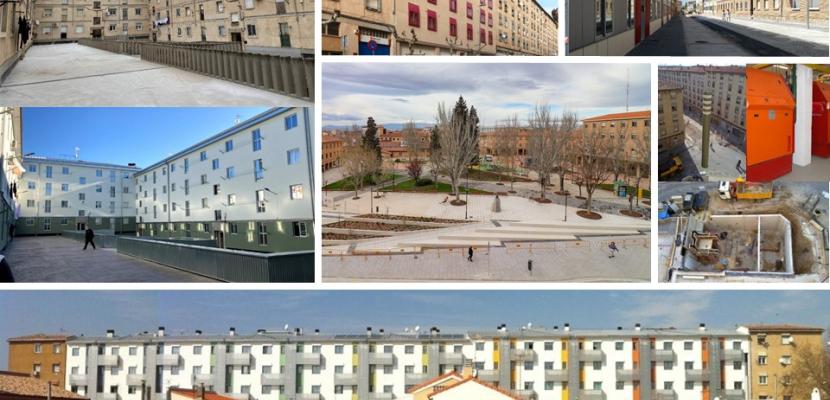
Energy district renovation in Tudela

About this good practice
Lourdes is a social housing neighborhood built between 1954 and 1972, with a very simple construction (lacking thermal insulation and with accessibility problems) and with a population dominated by elderly people and immigrants. Social, economic and climatic vulnerability is concentrated in this neighborhood.
With the aim of avoiding the general deterioration in 2009, Tudela City Council, together with the public company Nasuvinsa, promoted a process of rehabilitation and regeneration. This process has been driven by different European projects such as Lourdes Renove (2009-2011), Tudela Renove (2018-2020 and ELENA-PRIMAVERA (2021-2025).
In 2010 Nasuvinsa opened the One Stop Shop to provide technicians and citizens a meeting point, where they are offered technical, social and economic support.
Through the cooperation between administrations and thanks to the participation processes with the inhabitants it has been possible to renovate 956 homes. 514 have had their thermal envelope renovated, 54 have had their accessibility problems solved and a heat network supplying 486 homes has been renovated. In addition, several public spaces have been renovated to make them accessible and green.
This has resulted in environmental benefits (reduced consumption and CO2 emissions, incorporation of renewable energy), economic benefits (energy savings in the medium and long term) and social benefits (improved quality of life, ensuring the permanence of neighbors and social cohesion).
Resources needed
The total investment for the renovation of these 956 dwellings was around 16.4m€.
Several sources of financing have been necessary to finance this amount: City Council´s and Government of Navarra´s grants, European and state grants and homeowners private investment.
Evidence of success
The evidence of the success of this process is the result of 956 dwellings refurbished. 514 of them through thermal envelopes, 54 homes that have solved their accessibility problems and a heat network that supplies 486 dwellings renovated.
Potential for learning or transfer
The learning potential is given by the integral support system that has been defined. The work of accompaniment and advice throughout the renovation process, both for citizens and technicians (architects, engineers, property managers). Throughout the process, the availability of technicians trained in technical, social and economic aspects is key to the success of such long processes. The one-stop shop system located in the neighborhood itself is key.
Also the public impulse through grants systems for rehabilitation is really important.
This process could be transferred to many European cities that share the problematic of mid-century working class neighborhoods that are in a process of deterioration with very similar energy, accessibility and social deficiencies.